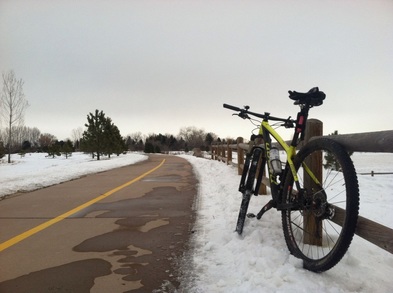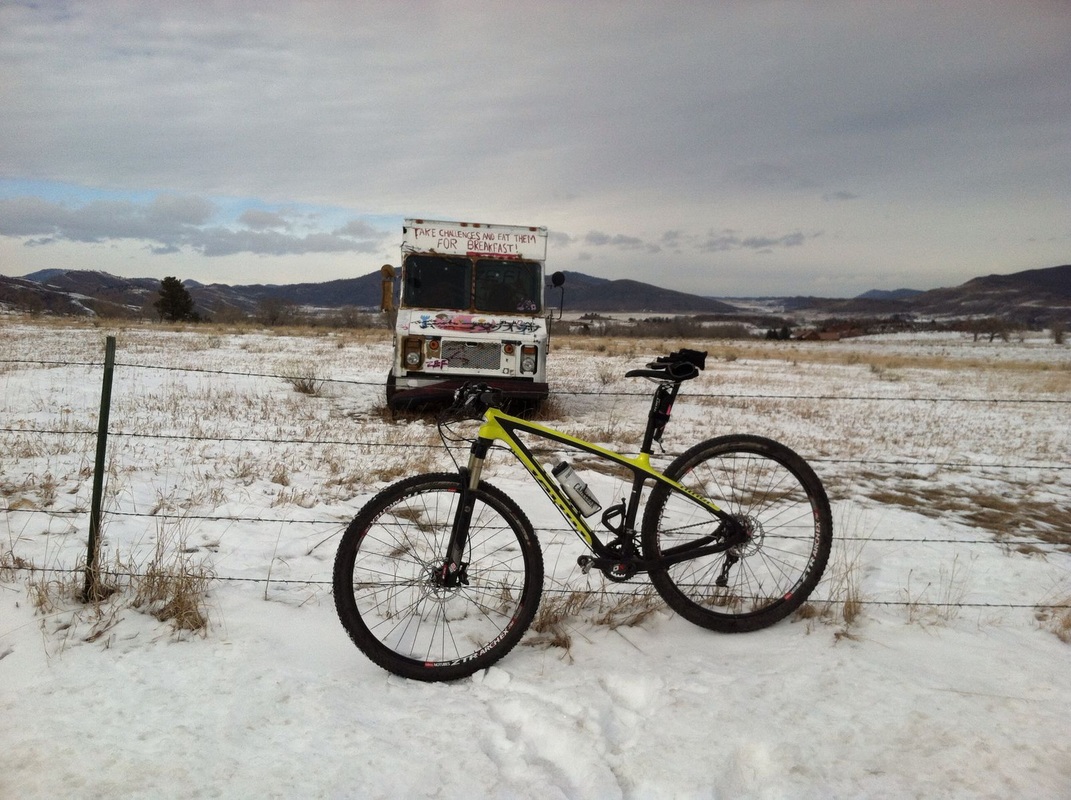|
In this blog entry I recall two experiences in particular, my decision in January to switch coaches and then the difficult process that I went through to re-acclimate to training at elevation after living for four months close to sea level in Hamburg, Germany.  January 2016, at the base of Rist Canyon, in Bellvue, Colorado. January 2016, at the base of Rist Canyon, in Bellvue, Colorado. January and February are tough months for outdoor cycling up and down the (Rocky Mountain) Front Range including my state-side home for the last few years, Fort Collins, Colorado. Home trainers and rollers are the only way to ride most days, 'only' unless you have heated gloves and a bike that sticks to snow and ice. That said, it's not all grey skies and cold. The patient cyclist can anticipate a handful of warmish days for getting outside to enjoy some well ventilated riding. And there is at least one local, indoor, alternative for social bikers: If you ever find yourself living in Fort Collins be sure to check out Source Endurance Training Center of the Rockies and say hello to the rocket that established and still heads the organization, professional road racer Zack Allison. Source endurance is a great, social way to train comfortably in the winter, inspired by music, the expertise of Zack and his pro and near-pro cycling employees. First-up on my list of responsibilities when I returned to Fort Collins from Germany was a personal decision that I'd been considering, reconsidering, and sometimes avoiding for weeks: to stay the course with the coach that mentored me in 2015 or to take another path, possibly even the path of self-coaching, in 2016. Now that I was back in The Fort, I couldn't put that decision off any longer, and arguably, I'd already put it off for too long. Fortunately, the universe is as unpredictable as it is interesting, and on one particular morning on about January 15th the unpredictable dropped-in for a visit and the difficult decision was behind me. From my new base camp in the home of friends and teammates on Dartmouth Trail, not far from Peloton Cycles, options for riding into Old Town Fort Collins or into the country were as convenient as a cyclist might have wished for. Nearby, city bike trails head-off in seemingly all directions, attractive options for avoiding in-town traffic and reaching-out to the less traveled roads of Larimer and nearby Weld County on the periphery of the Fort Collins hub bub. I'm in debt to 'The Royle Woody' family, including two patient boxers, for a handful of months of comfortable living at that location. On about 15 January, I was, by then, a few days into light training and scheduled for my first face-to-face conference with my coach at the same coffee shop where we started our coaching-athlete relationship back in December 2014, the Little Bird Cafe. When I left Dartmouth Trail en route to Old Town on my GT Avalanche 1.0 (the bike that inspired me to ride on; retired to city bike status in 2013), my intention was to ask tough questions until I was confident that the coach and athlete that overtrained in 2015 would avoid that scenario in 2016 without sacrificing performance. But sometimes planning and intention get derailed by poorly understood effects, by the unpredictable. In this case, the unpredictable showed-up part-way to town, at the intersection of Remington and Mulberry, about 1 km from the coffee shop. For reasons that I may never understand, at that traffic signal I was reminded one more time by my mind about the question I'd been asking for months, same coach or a change. A moment later, with a calmness and clarity typically reserved for non-fiction, I knew the answer was 'to move on' and that's what I did. After a professional conversation about the past, small stuff, and some of the status-quo, I explained that I had decided to move on, and to move on to a place that, at that moment, I was unable to visualize. I wasn't moving on to another coach that I had in mind. I was just moving on from what I felt was not an ideal scenario for my future as a cyclist and bike racer. Looking back, I have very few regrets from 2015. In contrast, I can easily visualize a long list of successes and a valuable education. Moving on from a coach isn't a reflection of the coach, not in every case anyway. It's more often moving on from a coach-athlete relationship. Like all relationships, the coach-athlete relationship is often ephemeral. It may even run its course in a season, as I felt ours had. Moving on doesn't mean forgetting or disrespecting the gifts from the past. I'll always be grateful for the coaching that I received from Pat Nash, and I wish him a long, fruitful career as a coach and his athletes great success. Perhaps reflecting some of the stress that resulted from 'the coach question', shortly after the conversation at the Little Bird I acquired a flu that knocked me down for a total of nine days. Not literally on my back, in the misery frame, feet up, but nearly so for a few days and then for many more days just lingering-on. The timing wasn't ideal given the way the 2015 season had ended (overtraining syndrome), or my recent decision to move on to unknown pastures. Then again, it forced me to be cool, to rest, and during that time I decided to return to the guidance of my coach from 2013 and 2014, Alex Hagman. Much to my relief, he held no grudge whatsoever for my professional departure after our very successful 2014 racing season, including an 'inside of the top 100' finish at the Leadville Trail 100. Moments after our first conversation we were back in a familiar space and mutually excited to make 2016 my best season to date. Patience followed as my flu eventually degraded to a mild nuisance before jumping ship entirely for a less motivated vector. By then it was February 3rd, my first scheduled day of training in 2016. For those of you that followed my training in 2015, you may recall that this is a full month later than the previous year. Already, and this would have been the case with or without the late January flu, training was going to be very different in 2016. Importantly, Alex and I would always do our best to integrate fun into the training equation, and plenty of time for recovery. I'll return to these and other details of my 2016 training plan in a forthcoming blog, In the meantime, I want to conclude this entry with recollections of the difficulty that I experienced regaining the mind and body that I'd lost shortly after the 2015 Growler. A melancholic mind, and legs that often lacked power, became my normal in the last six weeks of training and racing in 2015; and those legs seemed to be unchanged when I returned to Fort Collins in January. Despite the healing that I'd accomplished post-season, coming into 2016 I still had lingering concerns about my physical state. In particular, had I annihilated myself? Had the overtraining syndrome gone too deep to recover from in a single winter? To answer this question I went to see a medical doctor who assured me that my adrenal glands showed no sign of lingering stress associated with overtraining or any other source, a good sign. However, he also identified a significant deficiency of testosterone, not unusual for a 45 year-old athlete. Given the complications, namely "doping", of doing anything about the testosterone I decided, and have maintained this decision, to rely only on natural supplements (maca powder among other plant-based options). At the same time, I climbed back onto the bike and attempted to re-start what seemed like a very unwilling engine. A ride in late January, just before I fell ill, foretold the difficulties that I experienced in February. In particular, it was as if I was trying to ride in an atmosphere devoid of oxygen on a planet that had two-times Earth gravity. No doubt, four months living comfortably in Hamburg, near enough to sea level to occasionally record '0 feet or less' on a Strava elevation profile, explained most of my powerless engine. But then again, how much of what I was experiencing was the effect of overtraining from 2015? The question of permanent damage to my engine was hard to suppress. The month of February was a long struggle. And although March was better, the numbers from my rides still lacked a clear conclusion, damage or normal re-entry to training physiology? Looking ahead I hope I'll never again experience two introductory training months like I did in 2016. Part of the problem was my mental state, not quite 100% when I returned to Fort Collins. The remainder, it seems, was normal, early-season, physiological limitations. Through persistence, I eventually motivated the changes in my body, such as an increase in the density of mitochondria per cell, that are critical for the performance of an endurance athlete and cyclist. As a result, by mid-March I was beginning to have days when I had 'legs' and the lungs to power them. And not too soon either, my first race for the season was looming, an early season 100 km throw-down outside of Austin, Texas (April 9th). I'll share more about that race, the Austin Rattler, and many other details at Andre Breton Racing Dot Com in a forthcoming blog entry ... Comments are closed.
|
�
André BretonAdventure Guide, Mentor, Lifestyle Coach, Consultant, Endurance Athlete Categories
All
Archives
March 2021
|
Quick Links |
© COPYRIGHT 2021. ALL RIGHTS RESERVED.
|


 RSS Feed
RSS Feed